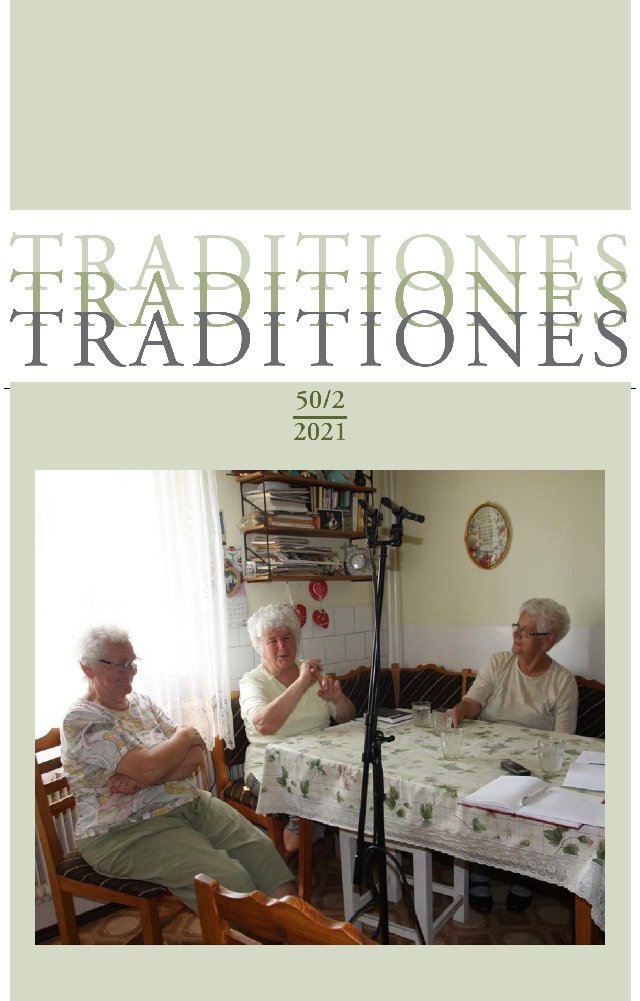Thinking, Speaking, and Singing Folklore
DOI:
https://doi.org/10.3986/Traditio2021500201Keywords:
language code, folklore, folklore text, dialect, traditionAbstract
This issue of Traditiones is dedicated to a contemplation of language in folklore; the ways we think folklore or perceive it from the aspect of linguistic properties, which differ between one language code and another. The authors deal with the intertwining of languages and the way they are affected by various factors – external and internal. Contributions emerge from the fundamental questions whether folklore and dialect are intrinsically connected, and what is the meaning of the language of folklore, or even multi-lingual systems in folklore texts and contexts. Some articles originated in the frame of the research project Thinking Folklore: Approaching Dialect from Folkloristic, Ethnological and Computational Perspectives, while others look at the various approaches to the treatment of dialect, language and folklore, as well as the lyrical, narrative and dramatic traditions of individual nations.
Downloads
References
Auer, Peter, Frans Hinskens in/and Paul Kerswill, ur./eds. 2005. Dialect Change: Convergence and Divergence in European Languages. Cambridge, New York: Cambridge University Press.
Boas, Franz. 1932. The Aims of Anthropological Research. Science 76: 605–613. https://www.jstor.org/stable/1656627. DOI: https://doi.org/10.1126/science.76.1983.605.
Bold, Valentina. 2021. “It’s Braw to Ride Round and Follow the Camp”: The Linguistic Journey of a Scots Song, with an Irish Soldier, through Space and Time. Traditiones 50 (2): 35–53. DOI: https://doi.org/Traditio2021500203.
Dattilo, Delia in/and Cinzia Citraro 2021. Recovering Vanished Sound Landscapes: Sounds, Identities and Multilinguality. Traditiones 50 (2): 141–164. DOI: https://doi.org.10.3986/Traditio2021500208.
Falconer, Gavin. 2006. The Scots Tradition in Ulster. Scottish Studies Review 7 (2): 92–107.
Foley, William A. 1997. Anthropological Linguistics: An Introduction. Malden, MA: Blackwell Publishers.
Golež Kaučič, Marjetka. 2021. Jezik govora, jezik pesmi: Med narečjem, nadnarečjem in standardom. Traditiones 50 (2): 55–78. DOI: https://doi.org/10.3986/Traditio2021500204.
Gregg, Robert J. 1985. The Scotch-Irish Dialect Boundaries in the Province of Ulster. Port Credit, Ontario: Canadian Federation for the Humanities.
Jakop, Tjaša. 2021. Prekmurske ljudske pesmi v glasoslovni razpravi Avgusta Pavla (1909). Traditiones 50 (2): 79–93. DOI: https://dpi.org/10.3986/Traditio2021500205.
Kelman, Ari Y. 2010. Rethinking the Soundscape: A Critical Genealogy of a Key Term in Sound Studies. Senses and Society 5 (2): 212–234. DOI: https://doi.org/10.2752/174589210X12668381452845.
Kumer, Zmaga. 1987. Lepa voda Ljubljančica. Traditiones 16: 247–254.
Kumer, Zmaga. 1996. Vloga, zgradba, slog slovenske ljudske pesmi. Ljubljana: Založba ZRC, ZRC SAZU.
McKean, Thomas. 2021. Multi-layered Communication and Function in Scottish Traveller Cant. Traditiones 50 (2): 95–121. DOI: https://doi.org/10.3986/Traditio2021500206.
Moric, Anja. 2021. A German “Linguistic Island” or a Linguistically Mixed Region?: Multilingual Practices in the Kočevska Area. Traditiones 50 (2): 123–140. DOI: https://doi.org/10.3986/Traditio2021500207.
Roud. The Roud Index Guide. https://www.vwml.org/component/content/article/20-vwml-site/vwml-help-pages/256-roud.
Strle, Gregor. 2021. Realist and Cognitive Perspectives on Meaning and Semantics. Traditiones 50 (2): 17–34. DOI: https://doi.org/10.3986/Traditio2021500202.
Downloads
Published
How to Cite
Issue
Section
License

This work is licensed under a Creative Commons Attribution-NonCommercial-NoDerivatives 4.0 International License.
Authors guarantee that the work is their own original creation and does not infringe any statutory or common-law copyright or any proprietary right of any third party. In case of claims by third parties, authors commit their self to defend the interests of the publisher, and shall cover any potential costs.
More in: Submission chapter






